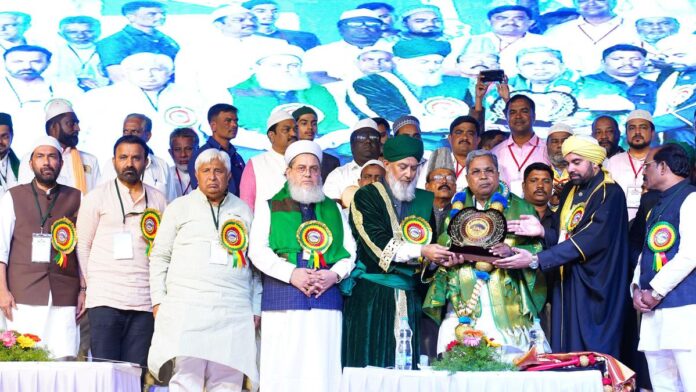Paromita Das
New Delhi, 15th September: In Karnataka’s ever-dynamic political landscape, Chief Minister Siddaramaiah has once again ignited debate with his government’s decision to allocate ₹398 crore for the development of Muslim colonies. The Congress-led cabinet approved the grant at Vidhan Soudha, promising to transform “backward colonies” into “model colonies” across 22 Assembly constituencies.
While the announcement has been hailed by supporters as an act of social justice, critics see it as yet another case of vote bank politics aimed at appeasing the Muslim community. The timing, scale, and selectivity of these allocations have sparked concerns about fairness and long-term consequences for Karnataka’s governance model.
Siddaramaiah: The Political Profile of a Mass Leader

To understand this decision, one must revisit Siddaramaiah’s political journey. A seasoned leader from Mysuru, he began his career with the Janata Dal before joining the Congress in 2006. Known for his Ahinda politics—a social coalition of minorities, backward classes, and Dalits—Siddaramaiah has consistently positioned himself as a champion of social justice.
His tenure has been marked by expansive welfare programs, from Anna Bhagya (free rice scheme) to loan waivers for farmers. However, his critics argue that his style of governance often blurs the line between empowerment and appeasement. The current allocation for Muslim colonies, along with other minority-focused initiatives, reflects his strategy of consolidating support among communities that form a significant electoral base for the Congress.
The Budget and Its Minority Tilt

The ₹398 crore grant is only the tip of the iceberg. Siddaramaiah’s 2025 state budget reflects a broader tilt towards minority-centric initiatives:
- ₹500 crore to start classes from pre-primary to PU at 250 Moulana Azad Model English Medium Schools.
- ₹400 crore for strengthening 100 Urdu medium schools.
- ₹150 crore for repairing and renovating Waqf properties.
- ₹1,000 crore earmarked under the Chief Minister’s Minority Colony Development Programme.
- Special allocation for the development of Hajj Bhavan and the establishment of a Karnataka State Open University (KSOU) unit for “deprived” Muslim students.
The government has also extended monetary benefits directly to the community: ₹50,000 for economically backward Muslim couples, increased honorarium for Muezzins (₹5,000 per month) and Imams (₹6,000 per month), and enhanced scholarships—including a foreign study grant increased from ₹20 lakh to ₹30 lakh.
On the surface, these initiatives seem focused on education, housing, and welfare. But critics argue they risk institutionalizing preferential treatment, alienating other communities, and fostering linguistic and cultural divides by promoting Urdu medium schools while simultaneously resisting Hindi in Karnataka.
Development or Appeasement?

The central question remains: is Siddaramaiah truly addressing historical deprivation, or is this a calibrated political strategy?
Supporters point out that many Muslim localities in Karnataka’s cities have suffered neglect for decades, with poor infrastructure, lack of sanitation, and limited educational opportunities. Investments in these areas, they argue, are necessary for inclusive development and are in line with constitutional values of uplifting disadvantaged groups.
Opponents, however, see a different picture. They cite Siddaramaiah’s earlier move to withdraw cases against Muslim extremists involved in the 2019 Chittapur stone-pelting incident as evidence of selective appeasement. They also highlight his defense of 4% OBC quota for Muslims in public contracts, arguing that such measures are less about empowerment and more about securing a reliable vote bank.
The scale of allocations—running into thousands of crores—stands in sharp contrast to other sectors facing pressing demands, such as farmers’ relief, rural employment, and drought mitigation. This imbalance strengthens the argument that the Congress government is prioritizing electoral arithmetic over equitable governance.
A Risky Gamble for Congress

Siddaramaiah’s approach reflects a broader dilemma in Bharatiya politics: balancing social justice with political pragmatism. His decisions may help consolidate minority votes, but they risk alienating other communities, especially Hindus who feel their concerns are sidelined.
Moreover, the optics of providing direct financial assistance to select groups—while the state struggles with fiscal deficits—raise serious questions about long-term sustainability. Welfare schemes should ideally be universal in design but targeted in delivery, ensuring no community feels excluded. By framing allocations in explicitly communal terms, the Congress risks deepening societal divides rather than bridging them.
The BJP, on the other hand, will likely use this as ammunition to portray Congress as indulging in “appeasement politics,” a narrative that resonates strongly in Karnataka’s polarized electoral arena.
Between Justice and Populism
Siddaramaiah’s ₹398 crore push for Muslim colonies may be rooted in his long-standing political philosophy of Ahinda and social justice. Yet, in execution, it blurs the line between legitimate empowerment and blatant appeasement.
While the development of backward colonies is necessary, making it community-specific rather than income- or region-specific could sow seeds of resentment. True social justice lies in creating opportunities for all marginalized groups, irrespective of religion.
In the short term, these policies may help Congress strengthen its minority vote bank. But in the long term, they risk reinforcing the very divisions that Karnataka’s diverse society is trying to overcome. Siddaramaiah has always been a leader unafraid of bold moves—but this one could prove to be a double-edged sword.
The post ₹398 Crore for Muslim Colonies: Welfare or Political Gamble? appeared first on Global Governance News- Asia's First Bilingual News portal for Global News and Updates.



